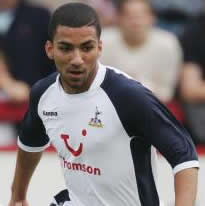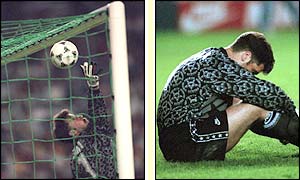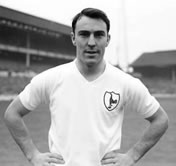[Article from Topspurs Column)
Surely, the time has come for Martin Jol to reconsider his policy of rotation of the strikers. For the two years he has been in charge, he has persisted with this policy, initially rotating Kanoute, Defoe and Keane and then including Mido into the equation. Now Dimitar Berbatov has been added to the mix and there is no indication that the strikers are going to become regular goal scorers, the MK Dons game apart. The rotational policy is explained as a way to keep all of the players happy and ensuring they get to play regularly but is it actually being used because he doesn’t know which pairing is the best? In his first season, his use of double substitutions – taking off Mido and Keane to be replaced by Kanoute and Defoe, or whatever combination of players he was using, seemed to be effective as tiring defenders were suddenly facing a fresh strike force who on occasions turned the game around. However, of late, no such rewards have been forthcoming and which ever partnership has played they have looked out of sorts and ill at ease, neither producing individually or linking as a partnership.
It is well known that Jol prefers to play a tall striker alongside a smaller one and so for much of last season he played Mido and rotated Defoe and Keane. That at least gave some consistency but this season, the partnership changes from game to game and none of the players have shown their true goal scoring ability. Individually, with good service, each of the strikers is capable of scoring regularly in the Premiership – all three from last season have shown that, while Berbatov was a leading goalscorer in Germany. However, collectively, their performances have not been equal to the sum of their parts – the fans have been waiting since April, 2005 for Spurs to win a Premiership game comfortably. Aston Villa at White Hart Lane, while Kanoute was still around, were the last team to be beaten by a large score while Spurs only scored three goals on six occasions last year and their highest margin of victory was two goals – even in games they controlled they were unable to make their dominance count.
Strikers need a good service with goal scoring opportunities created for them from midfield and certainly early in the season, with Lennon injured, Spurs’ football was very mundane and pedestrian. However, recently they have created more chances but have not managed to take them. The strikers also need to develop an understanding for it to become a goal scoring partnership, and this can not be helped by the constant rotation. Confidence plays a big part in any strikers’ game so being omitted from the team, even after scoring, must play on their minds – knowing that even if they get a goal, or two, it is no guarantee of a place in the starting line up for the next game.
Through Spurs’ history there have been strong striker partnership on which success was based – Teddy Sheringham and Jurgen Klinsmann, Steve Archibald and Garth Crooks, Martin Chivers and Alan Gilzean, Gilzean and Jimmy Greaves, Greaves and Bobby Smith, Smith and Les Allen in the ‘Double’ team – all developed an understanding and a goalscoring partnership. At other clubs the same is evident – the great Liverpool team had John Toshack and Kevin Keegan, while an earlier generation had Roger Hunt and Ian St.John and Leeds United had Allan Clarke and Mick Jones.
For the benefit of the team, Martin Jol would be advised to re-consider his thinking and look at the possibility of deciding on his best partnership and settling on it for a period to give the players an opportunity to gel and develop an understanding which should lead to an increase in the number of goals scored by Spurs. It would probably be appreciated by the midfield players as well, as they would develop a better understanding of how the strikers want the ball played and so be more able to develop the game accordingly.
While the strikers are rotated from game to game, the same policy does not apply elsewhere in the team – the manager knows that his best central defensive partnership is King and Dawson, so they appear every game unless either is unavailable through injury or suspension. Similarly, in midfield there is less rotation. While more players are used – it is mostly trying to make the best use of those available to overcome the deficiency of a left sided player capable of making the position his own.
The changes in selection for the Carling Cup game are understandable and gave members of the squad an opportunity to play. With so many games, there will be a need to call on these players because of injury or wanting to rest someone who has played a number of consecutive games or in preparation for an important match but it shouldn’t call for the strikers to be alternated in every game.
Who will the strikers be against Club Brugge? On his lacklustre and frustrating performance against Watford, Berbatov probably shouldn’t play but his display in Europe against Besiktas suggests he is more suited to the style of play for Europe than the hustle and bustle of the Premiership. To partner him, Defoe may get the opportunity ahead of Keane who has yet to show the inspired form of the second half of last season.
Farming has moved on from that early rotational policy so perhaps after two years as manager, it is time for Jol to dump the rotation of his strikers and give them the chance to develop the understanding and partnership required to score goals. Rafael Benitez’s persistence with a similar system at Liverpool isn’t proving any more effective. The success or failure of this season for Spurs may depend on how Martin Jol resolves the conundrum of the team’s inability to score enough goals. The goal scorers are there – but can they be blended into a successful goal scoring partnership capable of challenging for honours?
It’s over to you Martin – now is the time to act – it’s time to make that decision as to who will make the best striking partnership at the club.
 |






















